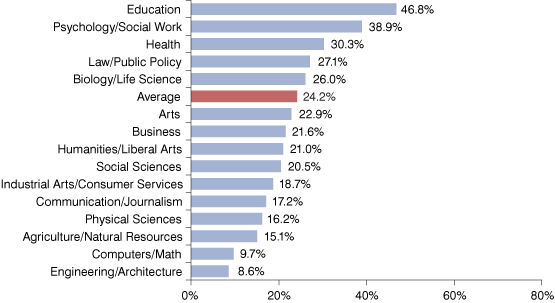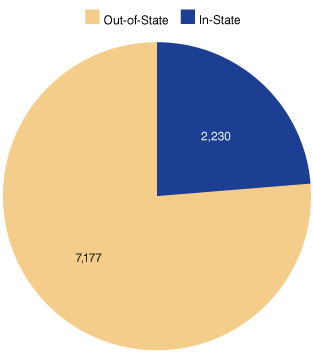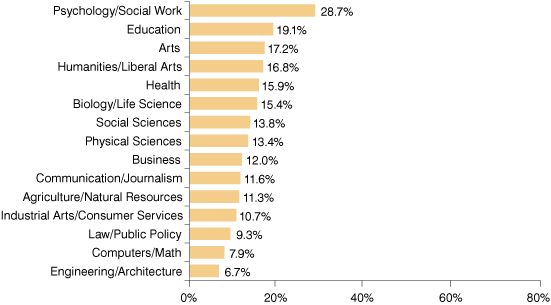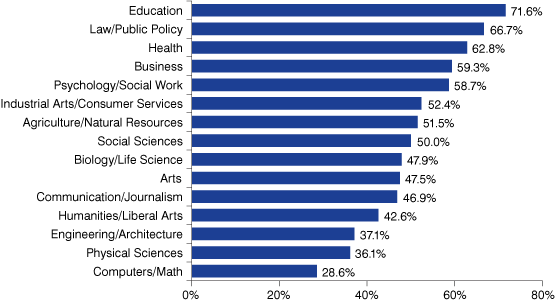Top Level Degrees in Indiana: A Look at the Numbers
The doctorate is the highest degree one can earn in most fields of study, qualifying the recipient as an expert and qualified to teach college. The requirements for obtaining a doctorate (usually referred to as a Ph.D.) in the U.S. typically include the successful completion of pertinent classes at an accredited university, passing a comprehensive examination, and the completion and defense of a dissertation.
A Ph.D. isn't just for teaching though. More and more employees with doctorates are being sought by companies in need of specialized expertise in particular disciplines. We see this in pharmaceuticals, of course, as well as businesses hiring people with doctorates in computer science, psychology, linguistics and other fields. In 2010, 36,579 Hoosiers (25 and older) were estimated to have a doctoral degree, up 26 percent from 2000.
Production and Retention
We wanted to look a bit deeper into Indiana's state university production of doctorates using the Indiana Workforce Intelligence System (IWIS) and following up on work reported in the study "How Education Pays in Indiana" (available at the IWIS website). IWIS is a longitudinal data system that can help determine whether students work in Indiana. The limitations are clear: state-supported colleges and payroll employers (those that employ more than two or three people and pay unemployment insurance taxes). However, state colleges enroll more than two-thirds of college students in Indiana and payroll employers employ more than 95 percent of workers. So, if not comprehensive, it does provide a very large sample for us to work with. We also need to keep in mind that IWIS currently has no way to gauge self-employment or those folks who work in other states but live in Indiana.
Those limitations covered, we can focus on the 9,400 public university doctoral graduates between 2000 and 2009 and how many of those worked for an Indiana employer one year after graduation. Please note that payroll employers will include colleges, universities, private businesses, government and nonprofit entities.
Popular Majors
The fields of discipline in which doctorates were awarded spanned education (16 percent of the total), liberal arts (10 percent), physical sciences (9 percent) and life sciences (8 percent). Where we see considerable differences is in the doctoral field of the graduates who stayed to work in Indiana (see Figure 1).
Figure 1: Doctoral Remain Rates for Indiana's Public Institution Graduates–One Year Post-Graduation, 2000 to 2009

Source: IBRC, using IWIS data
The majority of those staying to work in Indiana were education majors (47 percent) followed by psychology/social work graduates (39 percent) and those with doctorates in a health discipline (30 percent). The doctoral graduates least likely to wind up on an Indiana payroll one year out included those with engineering or architectural degrees (9 percent), computers and/or math doctorates (10 percent), agriculture/natural resources degrees (15 percent) and those in the physical sciences (16 percent).
Where They Come From Influences Where They Go
Our analysis found that 24 percent (nearly 2,300) of those 9,400 doctoral graduates remained to work on an Indiana payroll one year after receiving their doctorates, while 7,100 did not. Whether these graduates stay or go seems strongly influenced by whether they were in-state or out-of-state students. As many would guess, the doctoral graduates most likely to remain and work in Indiana one year after graduation were Indiana residents (58 percent remained), while only 14 percent of the out-of-state graduates stayed to work in Indiana (specifically, on an Indiana payroll). Indeed, most of the students receiving doctorates from state-supported universities in Indiana are out-of-state students, comprising 76 percent of the 9,400 doctorates awarded from 2000 to 2009 (see Figure 2).
Figure 2: Doctoral Degrees Awarded from Indiana's Public Institutions by State Residency, 2000 to 2009

Source: IBRC, using IWIS data
Most of the out-of-state doctoral graduates don't remain to work on an Indiana payroll. Those with doctorates in psychology/social work stayed on at the highest percentage; meanwhile, engineers and computer scientists were among the least likely to remain—for both out-of-state and in-state students (see Figures 3 and 4).
Figure 3: Doctoral Remain Rates for Out-of-State Graduates (2000 to 2009) by Academic Major

Source: IBRC, using IWIS data
Figure 4: Doctoral Remain Rates for In-State Graduates (2000 to 2009) by Academic Major

Source: IBRC, using IWIS data
Indiana and Other States
Indiana's public universities grant approximately 1,000 doctorates each year and that gives us an idea of the supply. What about demand? One way to consider that is to understand how many adults in Indiana hold doctorates and how we compare to other states. One percent of Hoosier adults 25 or older (36,579) have a doctorate, the same rounded percentage as 43 other states. The District of Columbia ranks highest at 4 percent, followed by Maryland, Massachusetts, New Mexico, Connecticut, Delaware, Vermont and Virginia all at 2 percent. These are small proportions, as well as remarkably similar across the states. Perhaps as more businesses and nonprofits seek Individuals with such high levels of expertise, we will begin to see some change in those proportions.
In the meantime, we plan to delve further into IWIS insights and welcome your feedback on our occasional reports in InContext using this important resource.
Carol O. Rogers
Deputy Director and Executive Editor, Indiana Business Research Center, Indiana University Kelley School of Business
Amia Foston
Economic Research Assistant, Indiana Business Research Center, Indiana University Kelley School of Business
